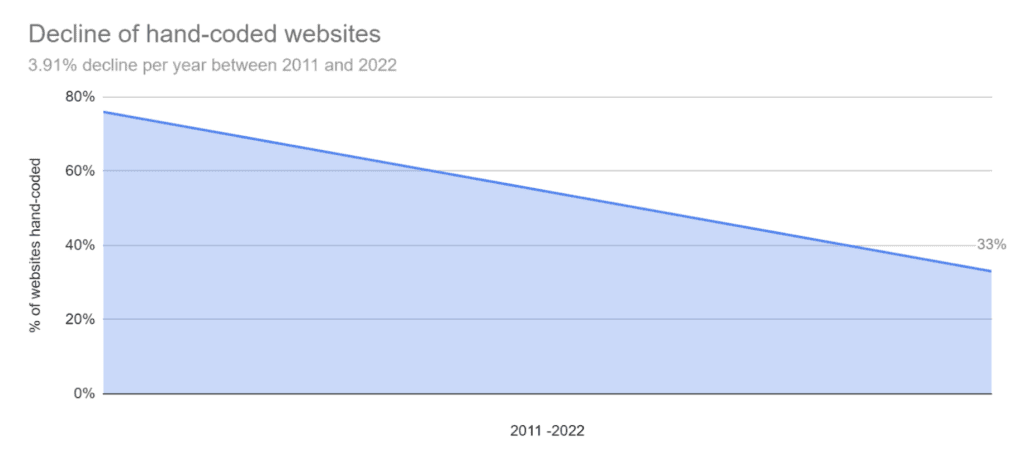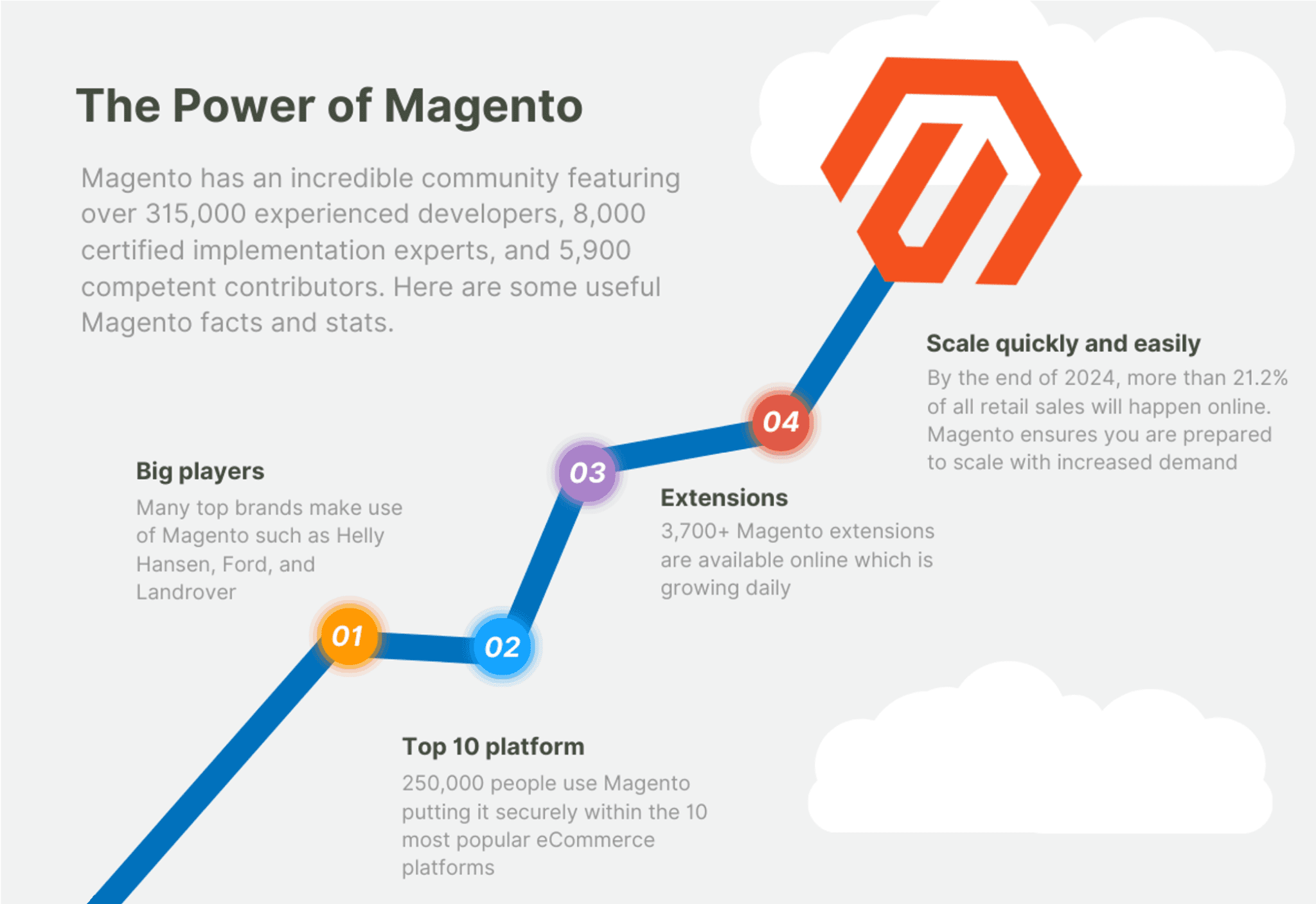Open source projects allow individuals and businesses to gain access to powerful software and tools without needing to worry about expensive licensing and software costs, and this is no different for open source websites and eCommerce developments.
In addition to the cost savings, open source allows anyone to modify and build upon existing features and functionality. This means projects tend to innovate very quickly using the strong community of open source developers and contributors. For future-proof technology solutions, there’s no better option. However, for the non-tech-savvy, it can be a worry and difficult to know how to start, which is why we have made it our mission to work with business and website owners to help them achieve their goals using open source.

Create bespoke top-tier websites with open source CMS platforms. Photo by Hal Gatewood on Unsplash.
To understand more, visit the following link for a more general background on open source and what this means for business.
Introduction to open source web development
- 1 Introduction to open source web development
- 2 The best open source CMS platforms
- 3 Why CMS plays a role in open source eCommerce development
- 4 Open source eCommerce platforms
- 5 Choosing the right platform for building open source websites
- 6 Tips for getting started with your first open source web development project
- 7 Next steps
Web development has been at the heart of open source, allowing users to create customisable and affordable open source websites that are suited to pretty much any situation. From blogs to community websites and eCommerce retail stores, these can all be developed using open source web design software and tools that, once set up, are user-friendly for business and website owners to manage.
To put it simply, it’s free software made available through an open source licence.
Open source web design software tools like those we mention below grant full access to source code, meaning that any organisation or company can harness a strong foundation to build on while working in tandem with clients, catering to their needs.
No matter whether it’s a complex open source eCommerce development project or a simple 5-page brochure website, there’s a huge selection of providers and software tools to choose from.
The best open source CMS platforms
You’ve likely heard of content management systems while researching open source software, but what exactly is a content management system?
A content management system, or CMS, allows you to easily create and publish new pages to your website without the need for coding experience. Open source CMS platforms have become increasingly popular in recent years coinciding with a sharp decline in hand-coded websites made from scratch.
Hand-coded websites (also known as bespoke or custom websites) were once the only viable way to progress in realising the vision for your website. There were numerous limitations however such as:
- Coding skills – requires coding skills during creation & whenever future changes are needed
- Cost – any large project was unviable for most businesses due to cost
- Inefficient – difficult to manage without support for PHP and database-driven content delivery
- User admin – zero or limited user roles and admin capabilities
- Features – very limited security features in place
- Lock-in – having a hand-coded website often means you are locked into the developer who created the site
Today, hand-coded websites still have their place, particularly for highly specific or complex needs where full control over every aspect of development is essential. They’re often used by large corporations with dedicated development teams. However, the appeal for small to medium-sized businesses has decreased in the last decade due to more affordable and powerful open source CMS options becoming available, which reduce the need for coding, and offer a plethora of database-driven features that achieve results that early hand-coded websites could only dream of.

The decline of hand-coded websites from 2011 to 2022. Source: wpbeginner.com.
Below, we provide a list of the best open source CMS platforms available, at least in terms of overall popularity.
WordPress
What was once a simple blogging platform has become the most popular open source CMS by a significant margin. With a huge community of users on hand to assist with issues or general advice, WordPress is a fantastic foundation to use for your website and has WooCommerce available as an essential eCommerce plugin. The huge number of plugins make it incredibly versatile, allowing a highly-tailored website the likes of which was previously reserved for hand-coded expensive projects.
Joomla
Joomla is another popular CMS that has a large dedicated community bringing a wealth of knowledge for users to draw from. Joomla has a huge selection of extensions that allow users to shape their website’s functionality – allowing the platform to be just as functional as an eCommerce website as it is for blogs.
Drupal
The Drupal platform is a modular and powerful CMS favoured by large organisations and even governments due to its security features and how well the platform can scale. Much like the other platforms mentioned, The Drupal platform has a range of useful extensions along with a strong community meaning you are never alone if you run into any problems with your Drupal website.
Typo3
Typo3 has been around for a long time but has seen a rise in popularity for enterprise projects in recent years. This is a flexible and scalable platform that has a growing community. One of the features Typo3 is praised for is its default versatility – providing functionality that other platforms would rely on third-party extensions for.

CMS market share, including open source web design software platforms like WordPress, Joomla, and Drupal. Sources: wpbeginner, w3techs.
As far as the CMS market share goes, there’s clear the best open source CMS is WordPress accounting for over 62% of all CMS websites. As depicted in our chart, Joomla, Drupal, and Typo3 pale in comparison when it comes to relative popularity — but they still fit an incredibly useful niche.
Given these are all open source CMS platforms, it’s clear that open source collectively dominates the overall market share when compared to the remaining 32.9% which consists of proprietary players like Wix, Squarespace, Adobe, and smaller custom platforms.
This is useful information to know, but how does it tie into open source eCommerce development?
Why CMS plays a role in open source eCommerce development
Popular CMS websites such as those built using WordPress and Joomla are frequently used by businesses to power their eCommerce stores for several key reasons.
Let’s get straight to the point and highlight why open source CMS platforms are a perfect fit for eCommerce utilisation:
- Regular security updates — CMS platforms are regularly updated and receive quicker hotfixes for the most critical issues that need a fix.
- Comprehensive knowledge bases — As we mentioned, the knowledge bases and community for CMS are some of the strongest around. Have a problem with your website? It’s nearly guaranteed someone else has experienced it and has the fix ready for you.
- Third-party functionality — Third-party open source web design software via plugins and extensions is integral to the versatility that CMS platforms offer. Most platforms boast an extensive list of additional features that can easily be added to your chosen platform.
- Buyer confidence — Knowing that your online store is built on a reliable and familiar platform can have a positive impact on buyer confidence.
- Scalable systems — Using CMS platforms offers a scalable infrastructure that is built to grow alongside your business. This prevents the pain of having to migrate to other systems when you outgrow limitations as a result of using hand-coded websites.
- Efficient management — Efficiently manage stock, users, and product pages without needing to be a coder. The tools and user interface CMS platforms have are fast and user-friendly.
- Accessibility — Managing your store is made accessible via simple easy-to-use interfaces such as drag-and-drop and visual builders like Divi or Elementor which work with WooCommerce for WordPress. This provides customisation and flexibility once reserved for bespoke, expensive solutions.
- Future-proofing — As the security features roll out, so do new features. Building your business with CMS and open source web design software tools like WordPress allows for peace of mind, and confidence in platform longevity.
Open source eCommerce platforms
Many storefronts commonly use the aforementioned CMS platforms along with third-party extensions, plugins, and add-ons for eCommerce functionality.
Some of the most popular options here include:
- WooCommerce for WordPress
- VirtueMart for Joomla
- DrupalCommerce for Drupal
- Aimeos for Typo3
However, some open source platforms are made specifically for eCommerce use. This can trim some of the fat leaving you with just the functionality that you need. Open source eCommerce platforms offer a refined set of tools that are solely focused on catering to eCommerce businesses.

Platforms for open source eCommerce development make growth easy to handle. Photo by Growtika on Unsplash
Magento Open Source
Known by many as the leader in open source eCommerce development, Magento is a popular choice amongst eStore owners both large and small.
Much like other CMS platforms, Magento has an extensive selection of plugins, extensions and modules that increase and adjust the platform to your liking. What sets Magento apart from the competition is flexible scalability.
What I mean by that is when you scale your store and services, Magento also allows for options that come with such scalability such as the ability to manage multiple stores — ideal for businesses looking to expand their eCommerce presence.

The power of Magento. Sources: savemycent
OpenCart
A popular open source eCommerce platform with a user-friendly interface is OpenCart. Much like the previously covered CMS platforms, OpenCart is ideal for non-coders and offers an intuitive and easy-to-use system for managing users and content. Much like Magento, OpenCart offers functionality for multiple stores (with international support) and also has a strong community in terms of both documentation and extensions.
nopCommerce
Built upon the ASP.NET framework (a development platform from Microsoft) and an alternative to PHP-based open source websites, nopCommerce is another platform for creating eCommerce open source websites that boast an impressive set of features.
Ideal for scaling and providing flexibility, this is another eCommerce platform that is worth consideration for those who are looking to choose a robust and reliable platform for their store.
NopCommerce is a unique solution in that it offers vendor accounts allowing individual businesses to have their own accounts that sell under one unified store making it well-suited for use as an online marketplace.
PrestaShop
Striking the perfect balance between complexity and accessibility, PrestaShop is an eCommerce open source website solution that has a large marketplace full of extensions that, much like the other options, allow you to make the exact online store you want with minimal effort.
Prestashop also supports multi-store management and has a large community of dedicated users that provide a wealth of support via documentation and guides. PrestaShop is a robust and highly customisable platform that is a good choice for both simple stores and more complex multi-store international websites.
Choosing the right platform for building open source websites
With so many fantastic options available for building open source websites, it can be a daunting task deciding which platform is best-suited for you and your business. It’s a big decision and worthy of careful consideration based on what your needs and requirements are currently, and what they might be in the future.
Here are some considerations you should keep in mind when choosing your platform.
- Complexity — Even though the majority of CMS-powered open source websites have drag-and-drop and WYSIWYG (what you see is what you get) interfaces, some may slow you down if you aren’t familiar with their ecosystem or platform. Investigate which platforms have the most user-friendly interfaces for the backend (administration) area of the website. Being as efficient as possible is extremely important so take extra care when looking at how these systems are managed for webmasters and administrators.
- Hosting — With hosting services, the cheapest isn’t always the best. Some will lack the required features for your eCommerce site so ensure your chosen package has sufficient bandwidth, speed, and any other essentials that you will need. Many mid-tier and above hosting providers offer a one-click installer helping you get up and running from scratch. A popular method for this is via the use of cPanel. If you are starting from scratch, be sure to check if your host supports easy installation of your chosen platform. This saves you time and potential headaches if you are new to website hosting and the setup process.
- Functionality — Perhaps an obvious one, but look carefully over the default functionality of your open source website CMS or eCommerce platform. While true that nearly all platforms offer third-party solutions to nearly any type of requirement, many can still require frequent updates to maintain compatibility and can sometimes cost money to obtain through the respective marketplace. It’s always smoother sailing if your eCommerce CMS provides needed functionality by default. Also, consider the functionality you may need in the future should your store and business expand.
- Community and support — While most open source website CMS solutions have active and involved communities, it is worth diving into the available support documentation to ensure comprehensive coverage is available should you run into any problems. Your second line of support is the community forums or a wiki where thousands of people are available to answer your questions. Finally, you can search each forum to discover fixes to common issues over the years provided the community is active.
Tips for getting started with your first open source web development project
Getting started with your first open source web development project can be challenging, particularly if you are new to CMS platforms and website development.
The good news is, this is the perfect time to get involved with development of any kind. With the likes of AI and ChatGPT paired with GPTs such as Code Copilot and the abundance of user-friendly content management systems available, you have all the resources you need at your fingertips.
Another great tip is joining communities online and familiarising yourself with common features and common feature requests. This will allow you to get comfortable with the feature set available while learning about any limitations that come with your platform of choice.
We recommend getting in touch with us if you need assistance with your project, or would like a company to handle the sometimes complicated configuration process, allowing you to do what you do best — run your company.
Here are some quick at-a-glance tips to help you get started.
- Spend time researching the basics — YouTube and forums are your friends!
- Test – familiarise yourself via a test environment locally (i.e WordPress via WAMP stack)
- Ask for help – reach out to communities for help and test the waters
- Plan – list your required functionality and reference against native and third-party features
- Objectives – consider your future goals and expansion as well as your current needs
- Use AI – AI tools such as ChatGPT can make for a fantastic assistant when learning new software

Planning ahead is vital when choosing the best platform for open source wesbites. Photo by Marten Bjork on Unsplash.
Next steps
Open source web development provides a cost-effective and long-term solution for eCommerce businesses, website owners, and organisations of all kinds who are looking for longevity without the risk of future disruption.
By choosing one of the popular open source CMS platforms listed above, you minimise the risk of future platform migrations provided you research extensively regarding the type of platform that fits you best. Content management systems and eCommerce platforms provide complex features wrapped in simplistic interfaces and design choices making your job as a webmaster or business owner more accessible and efficient.
By tapping into the power of open source web design software and CMS platforms, you have the potential and power to transform your website into a successful powerhouse brimming with features that would have historically been inaccessible to the majority of small to medium-sized businesses.
If you need any help with setting up your eCommerce platform or website, please get in touch with us and our team will be there to guide you to digital success every step of the way.
If you have any insights, feedback or suggestions, please drop us a comment below or reach out to us on social media.





0 Comments